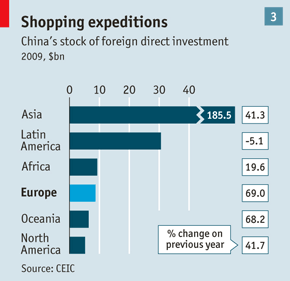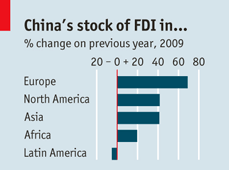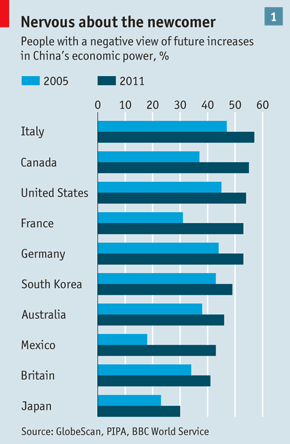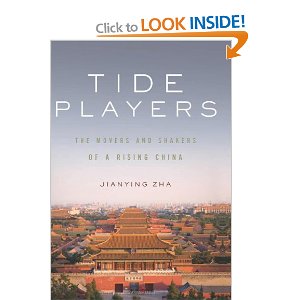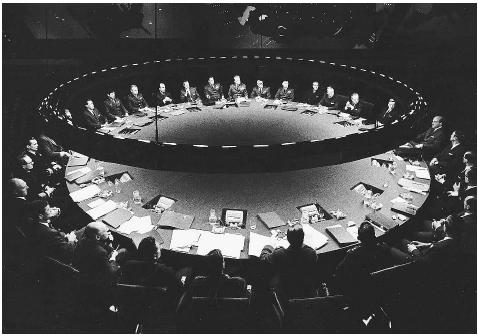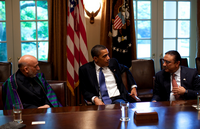What is eternal and ephemeral about China - and this modern world system we call globalization
 Wednesday, July 13, 2011 at 12:17AM
Wednesday, July 13, 2011 at 12:17AM  Fabulous op-ed in WSJ on 6 July by Liu Junning, an "independent scholar in Beijing."
Fabulous op-ed in WSJ on 6 July by Liu Junning, an "independent scholar in Beijing."
You should read it all. Here are my favorite bits:
First, Liu speaks to the infatuation in the West for the alleged "Beijing consensus":
This view fundamentally misunderstands the country's growth progress. China has indeed made great strides since 1978's "Reform and Opening" in alleviating poverty, opening up to the world, and making slow steps down the road of legal reform. Yet on closer inspection, the most significant transformations from the perspective of boosting prosperity have involved loosening of control over the people, not some alchemy of power and Marxism.
This becomes clear in comparing China's economic performance during periods when Beijing has been more closely versus less closely following the Beijing Model. According to MIT economist Yasheng Huang, "[W]hen measured by factors that directly track the living standards of the average Chinese person, China has performed the best when it pursued liberalizing, market-oriented economic reforms, as well as conducted modest political reform, and moved away from statist policies."
I have read such analyses too many times to count, and yet it still amazes me how many don't get it: China does best when it moves in the direction of the allegedly discredited Washington consensus and does significantly less well when it goes more statist. But the mythology (like Reagan "reducing the size of government") lives on.
Liu also dismisses the notion that defenders of Chinese authoritarianism make: that the Chinese naturally abhor Western-style rights:
This too is at odds with current experience. Simply talk to those peasants who have had their land arbitrarily taken, and we see that property rights are implicitly cherished by all, regardless of race or ethnicity. Despite Beijing's crackdown, lawyers and activists continue to press for Western-style rights.
The rest of the piece is a tour of Chinese history that shows that the ideas and practices of liberalism have flowered throughout. Again, Mao gets credit for reunification but also for perverting the system profoundly. China has always been far more capitalistic than realized. It was Mao's 30-year rule that was the historical aberration, as was his erratic authoritarianism.
Then the solid finish:
To say that the narrative of liberty vs. power is uniquely "Western" is to turn a blind eye to the struggles of those who have gone before us. Individual rights are not a Western development any more than paper and gunpowder are inventions that are uniquely Chinese. Is Marxism "German"? Is Buddhism "Indian"? Of course not. When ideas are born, they take flight into the world to be used, improved or discarded by all of humanity. Constraints on political power and the protection of individual rights belong to all.
The tragedy is that we Chinese don't have full access to these protections. That increasingly will hold us back instead of propelling us forward as proponents of a Beijing consensus believe. Real success for China in the 21st century will depend not on the Communist Party itself, but on the establishment of the rule of law, limited government, and further economic liberalization that opens China's market to the world.
Fundamental to this is the right to speak freely. China will truly prosper only when individuals such as Liu Xiaobo, Ai Weiwei and the many other Chinese patriots who speak for reform are safe in the knowledge that they can do so without a late-night knock on the door from the government.
I continue to believe that the Chinese need a certain historical distance from the Cultural Revolution, plus time to get used to their new-found wealth/development before democracy arises naturally from within - meaning the popular push gets so strong that the Communist Party is forced to birth two or more successor parties in order for the system to survive.
I will readily admit that, until that tumultuous process unfolds, there will be plenty in the West who buy into the Beijing-sold notion that somehow the Chinese are "unique" in their history and developmental trajectory. I personally think that's nonsense.
I also think that the real genius of the American System projected onto a global stage these past seven decades as an international liberal trade order-cum-the West-cum-globalization is that it enables countries like China to start the developmental jump and continue it with enough force - via a package that remains far closer to the Washington consensus than any other I've seen - to trigger the pluralization process that best fits the society in question (aka, what we call "democracy" but really mean as a republic or a government based on law). The timing is variable but inevitable if economic success is had (show me the large rich country that is both politically mature and not a democracy). Yes, in the era following the Cold War's end, we must suffer waiting out a host of countries and their evolutions, but as the Arab Spring shows, the people themselves will keep on trying - no matter the costs and frustrations.
To imagine democracy is on the wane in this era is, in my opinion, simply wrong-headed and stubbornly so. Ditto for free markets, understanding that we don't live in a world of pure or absolute anything and that these things ebb and wane with events.
But the march of history is beyond clear, as is America's supremely positive impact on it these past seven decades. Most of everything we consider to be good in this world has come about in the last seven or so decades. Go back before them - before America's ascension to global power - and you find everything much worse and on the path of self-immolation. Instead, we now have unprecedented peace, wealth, development and freedom - especially for women. These are not accidental events; the timing is incontrovertibly linked to America's role.
Which is why maintaining that role in a sustainable fashion is so crucial. "Post-American" is a self-defeating lie - a cancer within our ability to think in grand strategic terms. There is most definitely a "pre-American" world. There will never be a "post-American" one - nor should there be in a world that will be ruled by the middle - again, thanks to the system we created, nurtured and defended all these years.












